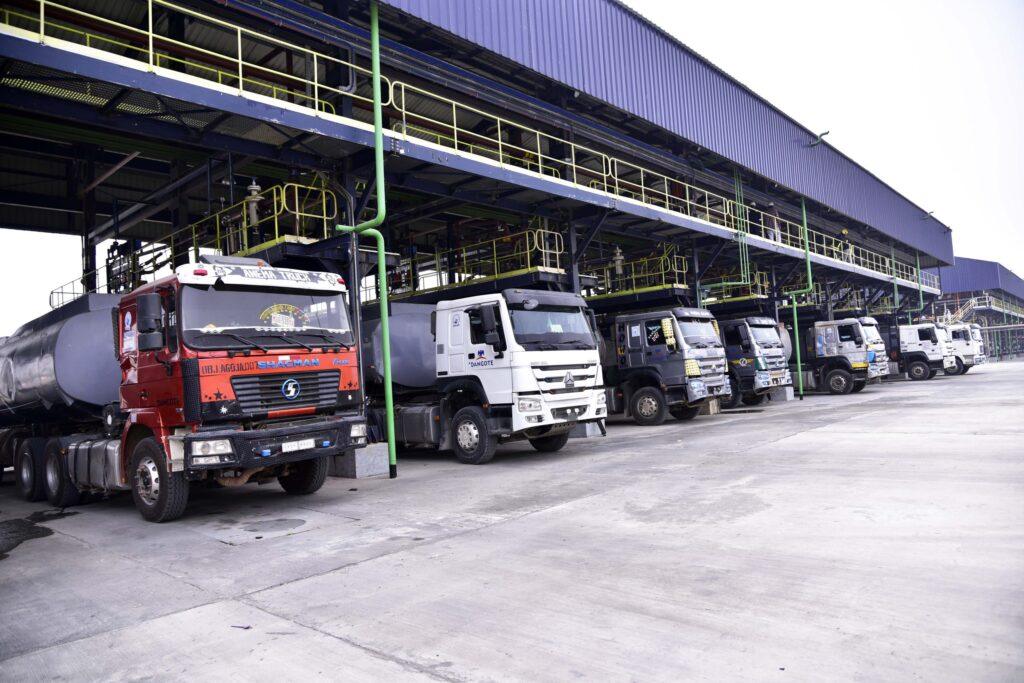It’s 25 days to the official launch of the highly anticipated direct fuel distribution by the Dangote Refinery and Petrochemical Limited, tension is mounting across Nigeria’s oil and gas sector. As the refinery prepares to deploy a fleet of 4,000 Compressed Natural Gas (CNG) trucks to deliver fuel directly to marketers and strategic industries nationwide, industry stakeholders are bracing for what many are calling a major disruption to Nigeria’s traditional fuel supply chain.
According to findings, no fewer than 25 petroleum marketers have already signed up for Dangote’s direct supply initiative, a sharp increase from the initial three who had earlier committed to the plan. This sudden surge in participation signals widespread industry alignment with the refinery’s logistics model and growing confidence in its capacity to reshape the downstream oil sector.
A senior Dangote Group executive confirmed the development, revealing that marketers are actively registering ahead of the August 15 rollout date. The refinery is gearing up to flood the Nigerian market with petroleum products using its own trucks, offering free distribution to marketers, manufacturers, and major players in telecoms, aviation, and retail fuel stations.
This bold move, aimed at reducing Nigeria’s dependency on fuel imports and ensuring nationwide availability of refined products, has been hailed by some as a game-changer, but not without controversy. Independent petroleum marketers are expressing mixed reactions. While many admit that they have no choice but to align with Dangote due to the current supply monopoly, others are warning about the long-term risks of market dominance.
Speaking on the development, the National Publicity Secretary of the Independent Petroleum Marketers Association of Nigeria (IPMAN), Chinedu Ukadike, admitted that Dangote has become the sole supplier of petroleum products in Nigeria and parts of West Africa. He explained that economic realities, including high pump prices and shrinking retail margins, have left marketers with no viable alternatives.
Read Also:
Dangote Refinery slashes petrol price again
Dangote Refinery expands distribution with 15 new partners, cuts fuel prices ahead of August rollout
Dangote Refinery begins free nationwide fuel distribution, to saves Nigeria ₦1.7 Trillion annually
Ukadike emphasized that anything capable of reducing fuel prices and easing logistics burdens is welcomed by marketers. He noted that retail operations have suffered due to low sales volume, with some stations unable to sell a full truckload of product in a month, leading to accumulating operational costs and financial strain.
However, Ukadike raised concerns over the potential for unchecked monopoly, urging government-owned and private refineries to rise to the challenge and provide competitive options to balance the sector. He warned that without competition, the current structure could threaten long-term industry sustainability.
Meanwhile, anxiety is growing among tanker drivers, who fear massive job losses once Dangote begins nationwide distribution using its own fleet. These fears stem from the likelihood that many independent marketers will abandon their current logistics models in favor of Dangote’s free delivery service, potentially rendering thousands of third-party tanker drivers and trucks redundant.
Several drivers who currently transport products from Dangote’s gantries say the new model could leave them without work as more marketers opt for cost-saving options. While some believe the Dangote Group may eventually absorb a portion of the displaced drivers into its workforce, uncertainty continues to cloud the future of independent operators.
National President of the National Association of Road Transport Owners (NARTO), Yusuf Othman, confirmed that consultations are ongoing among key stakeholders to assess the implications of the development. Though he declined to disclose the association’s official stance, he acknowledged growing concerns among his members and promised a formal position in the coming days.
As the Dangote refinery cements its role as Nigeria’s dominant supplier of refined fuel, the August 15 launch of its CNG truck fleet could mark the beginning of a new era in petroleum distribution, one that promises efficiency and cost reduction, but also raises difficult questions about competition, employment, and the future of Nigeria’s downstream oil economy.
